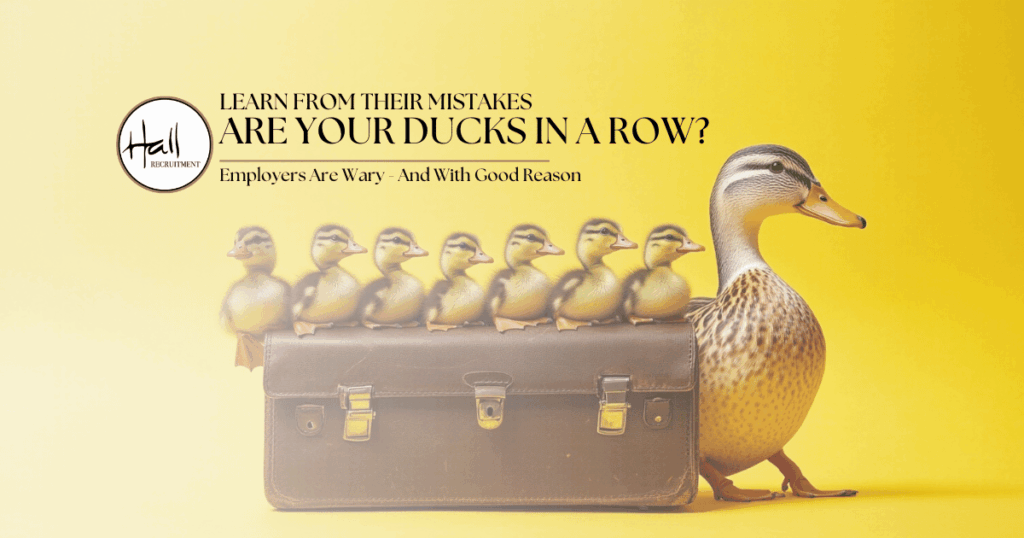#AreYourDucksInARow? #LearnFromTheirMistakes

Learn From Their Mistake:
Are Your Ducks In A Row?
Employers Are Wary
And With Good Reason!
The Reference That Cost the Job
Let’s be blunt. No matter how dazzling your CV is, how charming you are in the interview, or how many times you “manifested” the job—if your reference doesn’t back it up, your job offer can vanish faster than your last sick day excuse.
References. That word you skim past at the end of job ads as if it’s just a tick-box formality. Hate to break it to you, but for most employers, references aren’t an afterthought. They’re the final checkpoint before onboarding. And yes, they can absolutely make or break you.
Employers Aren’t Just Hiring. They’re Justifying.
Here’s what most candidates don’t realise: by the time an employer gets to the reference stage, they’ve already jumped through a ridiculous number of hoops just to get you there.
They’ve written a business case to get hiring approval. They’ve paid anywhere from hundreds to thousands to advertise the job (seriously—newspapers, LinkedIn, bus stops… it adds up). They’ve filtered out the ‘I’ll give anything a go’ crowd who didn’t read the ad properly. They’ve sat through rounds of CV screening, shortlisting, phone calls, and interviews. And finally, finally, they’ve found their preferred candidate. That’s you.
Then come the references. The safety net. The final reassurance that they haven’t just hired the world’s most convincing actor.
Because let’s face it—some candidates are brilliant in interviews. Too brilliant. Telling employers exactly what they want to hear, right down to parroting the company’s mission statement. But what they did in their last job? That’s a whole different story. And this is where the referee steps in.
The Wrong Referee Can Ruin Everything
We’ve seen it all:
- Candidates putting down their mates as references (using personal email addresses, of course—nothing screams “I made this up” louder).
- Referees who ghost the process entirely—no response, no completed forms, nothing.
- Referees who give such lukewarm responses, you’d swear they were trying to get revenge for stealing their parking space.
Employers are getting smarter. Most now insist on official company email addresses for references, not a Gmail or a Hotmail from your ex-manager-turned-friend-turned-untraceable. And many won’t accept the standard “letter of employment” anymore—it’s not enough. Reference forms now ask about performance, attitude, absenteeism, and whether you’d be re-hired.
And if the form doesn’t come back? Or worse, comes back half-completed with vague answers? That shiny job offer starts to wobble. In fact, we’ve seen offers pulled entirely because a reference didn’t materialise in time. And it’s always gutting. Weeks of effort, all undone because someone you trusted to help you get a job… didn’t.
Let’s Be Practical: How to Choose a Good Referee
🟢 Choose someone who actually remembers you – ideally someone who managed you directly.
🟢 Make sure they’re still with the company – HR can’t verify details from someone who’s since left.
🟢 Give them a heads-up – don’t list someone without checking first. If they’re going on annual leave for a fortnight, your job could be at risk.
🟢 Share the job description – help them write you a reference that actually matches the role you want.
🟢 Double-check their contact details – typos in an email address? That form’s not going anywhere.
Employers Are Wary—and With Good Reason
We’re seeing more and more employees change jobs every 3–6 months. It’s not always a red flag—but when it keeps happening, and a reference confirms they “struggled to take direction” or “weren’t the right fit for team dynamics”? That’s a red flag on fire.
Hiring the wrong person costs businesses, on average, €34,000. That’s not just salary—it’s training, onboarding, lost productivity, and starting the process all over again. So before you ask “Can’t they just trial me?” ask yourself if you’d work for free for six months. Because that’s how long it can take to get someone up to speed.
Final Word
References aren’t an optional extra. They’re not a tick-box exercise. They’re the moment where your CV and your real-life performance collide—and sometimes explode.
Pick your referees wisely. Prep them. Follow up. Because when it comes to job offers, silence from a referee can be just as loud as a rejection.



